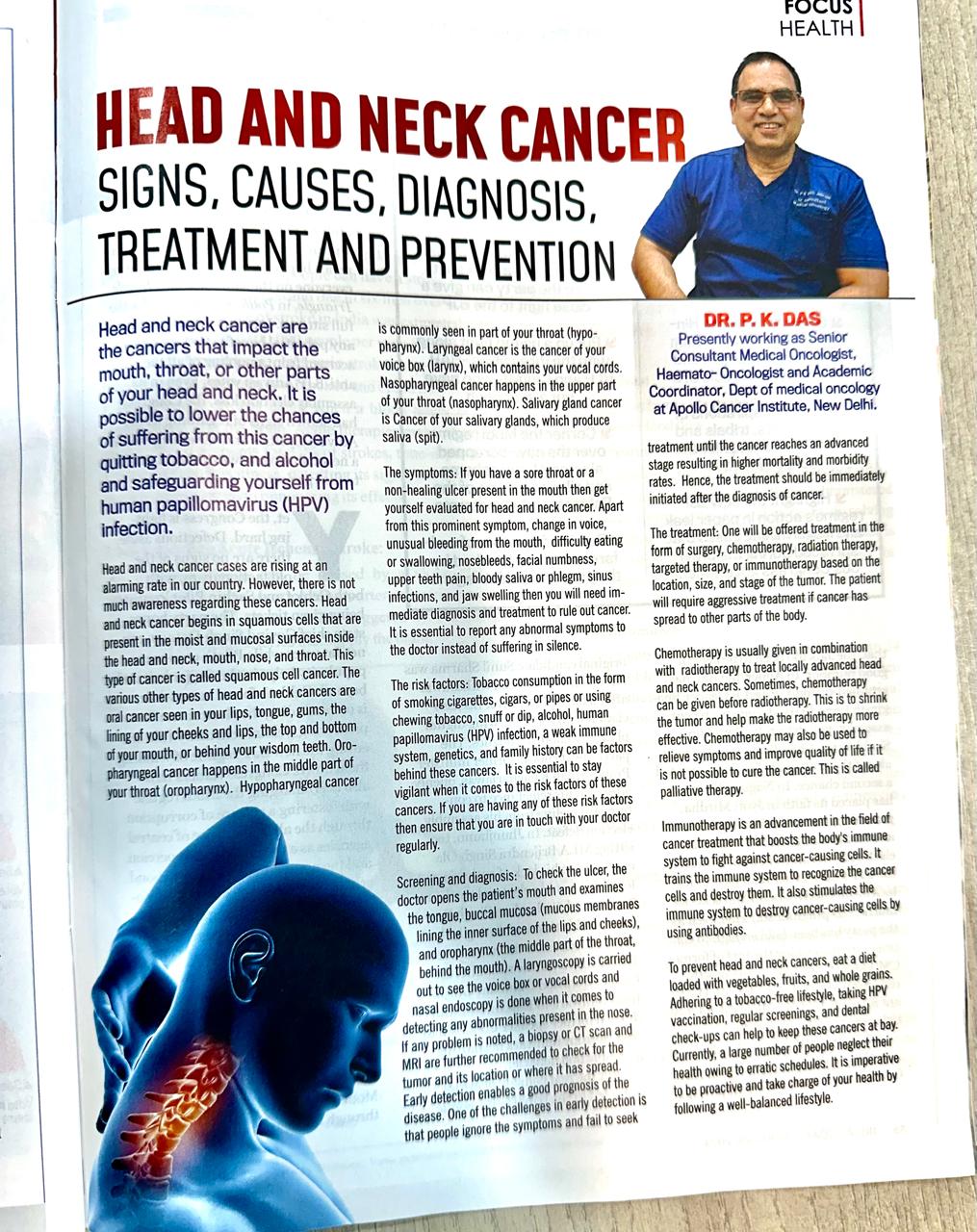|
Getting your Trinity Audio player ready...
|
Head and neck cancer are the cancers that impact the mouth, throat, or other parts of your head and neck. It is possible to lower the chances of suffering from this cancer by quitting tobacco, and alcohol and safeguarding yourself from human papillomavirus (HPV) infection.
Head and neck cancer cases are rising at an alarming rate in our country. However, there is not much awareness regarding these cancers. Head and neck cancer begins in squamous cells that are present in the moist and mucosal surfaces inside the head and neck, mouth, nose, and throat. This type of cancer is called squamous cell cancer. The various other types of head and neck cancers are oral cancer seen in your lips, tongue, gums, the lining of your cheeks and lips, the top and bottom of your mouth, or behind your wisdom teeth. Oro- pharyngeal cancer happens in the middle part of your throat (oropharynx). Hypopharyngeal cancer is commonly seen in part of your throat (hypo- pharynx). Laryngeal cancer is the cancer of your voice box (larynx), which contains your vocal cords. Nasopharyngeal cancer happens in the upper part of your throat (nasopharynx). Salivary gland cancer is Cancer of your salivary glands, which produce saliva (spit).

The symptoms: If you have a sore throat or a non-healing ulcer present in the mouth then get
yourself evaluated for head and neck cancer. Apart from this prominent symptom, change in voice, roke unusual bleeding from the mouth, difficulty eating or swallowing, nosebleeds, facial numbness, upper teeth pain, bloody saliva or phlegm, sinus infections, and jaw swelling then you will need im- mediate diagnosis and treatment to rule out cancer. It is essential to report any abnormal symptoms to the doctor instead of suffering in silence.
The risk factors: Tobacco consumption in the form of smoking cigarettes, cigars, or pipes or using chewing tobacco, snuff or dip, alcohol, human papillomavirus (HPV) infection, a weak immune system, genetics, and family history can be factors behind these cancers. It is essential to stay vigilant when it comes to the risk factors of these cancers. If you are having any of these risk factors then ensure that you are in touch with your doctor regularly.
Screening and diagnosis: To check the ulcer, the doctor opens the patient’s mouth and examines the tongue, buccal mucosa (mucous membranes lining the inner surface of the lips and cheeks), and oropharynx (the middle part of the throat, behind the mouth). A laryngoscopy is carried out to see the voice box or vocal cords and nasal endoscopy is done when it comes to detecting any abnormalities present in the nose. If any problem is noted, a biopsy or CT scan and MRI are further recommended to check for the tumor and its location or where it has spread. Early detection enables a good prognosis of the disease. One of the challenges in early detection is that people ignore the symptoms and fail to seek
DR. P. K. DAS Presently working as Senior Consultant Medical Oncologist, Haemato-Oncologist and Academic Coordinator, Dept of medical oncology at Apollo Cancer Institute, New Delhi. treatment until the cancer reaches an advanced stage resulting in higher mortality and morbidity rates. Hence, the treatment should be immediately initiated after the diagnosis of cancer.
The treatment: One will be offered treatment in the form of surgery, chemotherapy, radiation therapy, targeted therapy, or immunotherapy based on the location, size, and stage of the tumor. The patient will require aggressive treatment if cancer has spread to other parts of the body.
Chemotherapy is usually given in combination with radiotherapy to treat locally advanced head and neck cancers. Sometimes, chemotherapy can be given before radiotherapy. This is to shrink the tumor and help make the radiotherapy more effective. Chemotherapy may also be used to relieve symptoms and improve quality of life if it is not possible to cure the cancer. This is called palliative therapy.
Immunotherapy is an advancement in the field of cancer treatment that boosts the body’s immune system to fight against cancer-causing cells. It trains the immune system to recognize the cancer cells and destroy them. It also stimulates the immune system to destroy cancer-causing cells by using antibodies.
To prevent head and neck cancers, eat a diet loaded with vegetables, fruits, and whole grains. Adhering to a tobacco-free lifestyle, taking HPV vaccination, regular screenings, and dental check-ups can help to keep these cancers at bay. Currently, a large number of people neglect their health owing to erratic schedules. It is imperative to be proactive and take charge of your health by following a well-balanced lifestyle.

